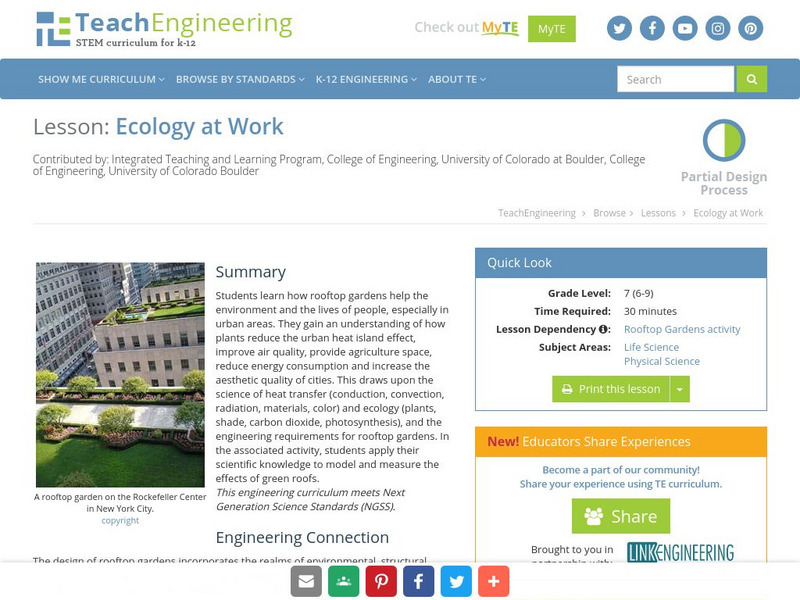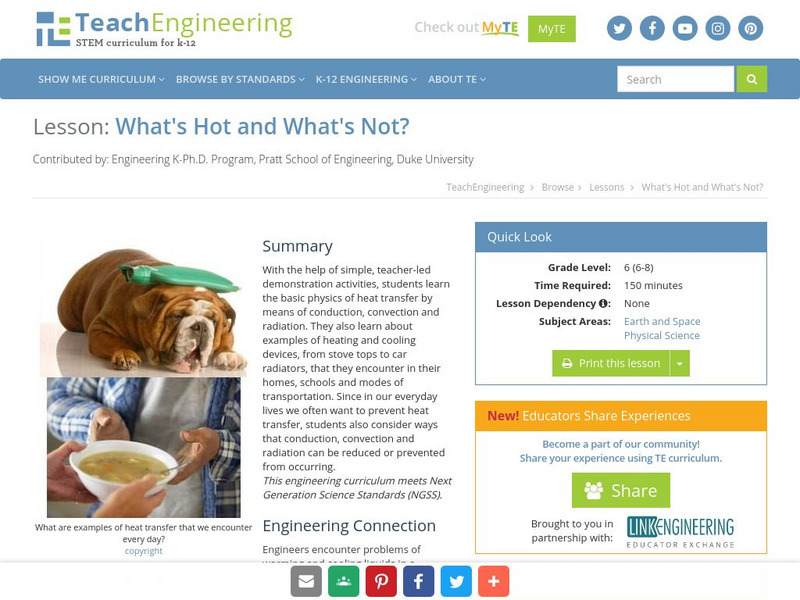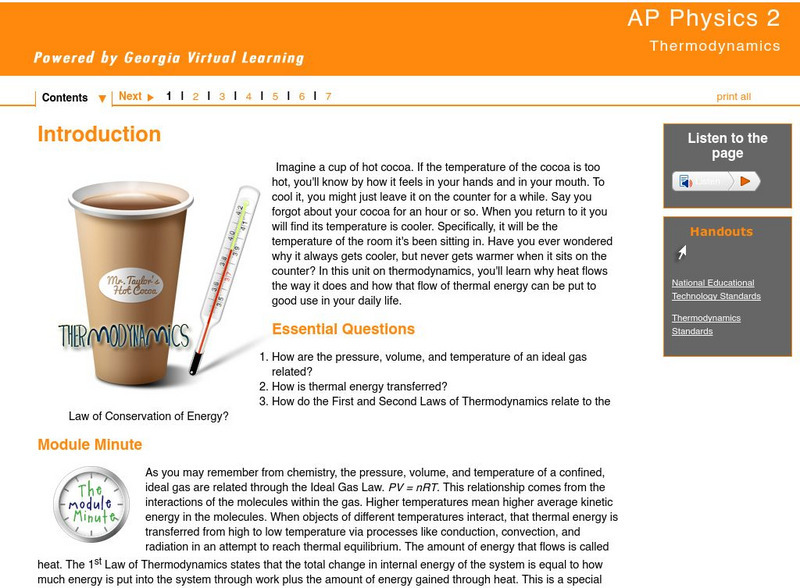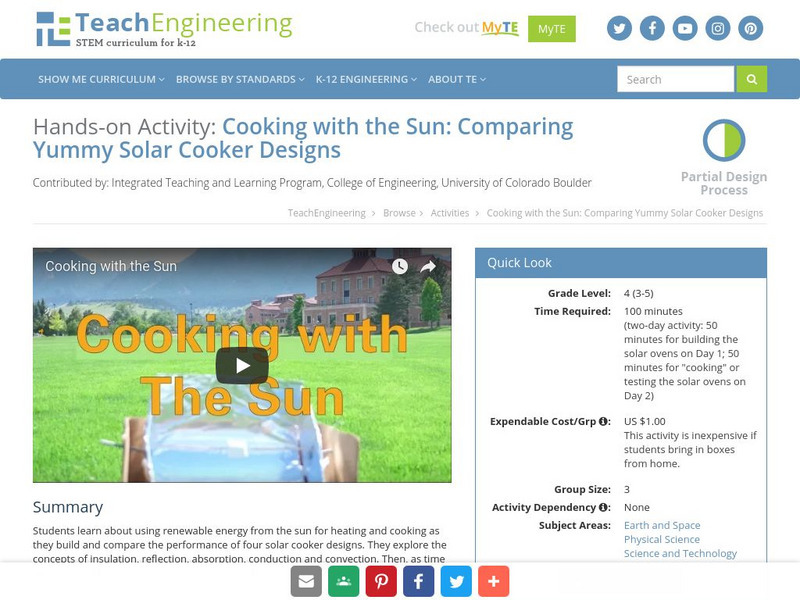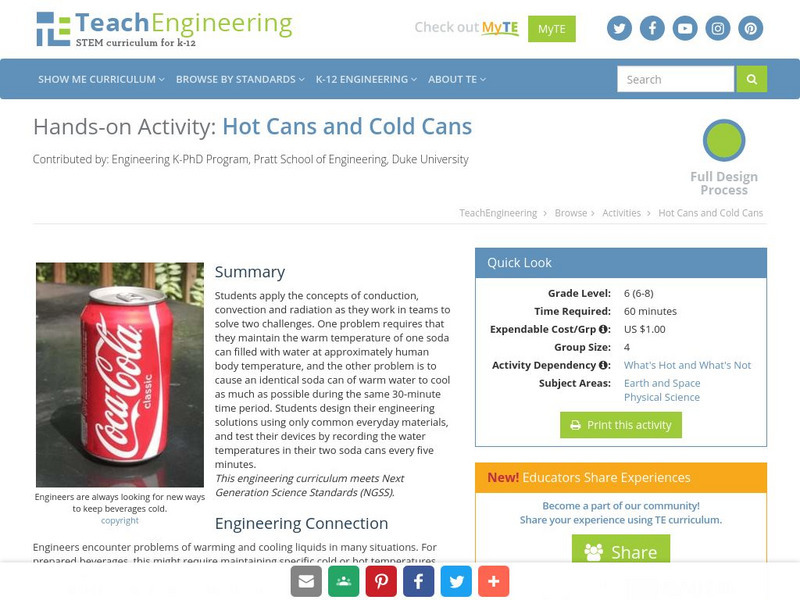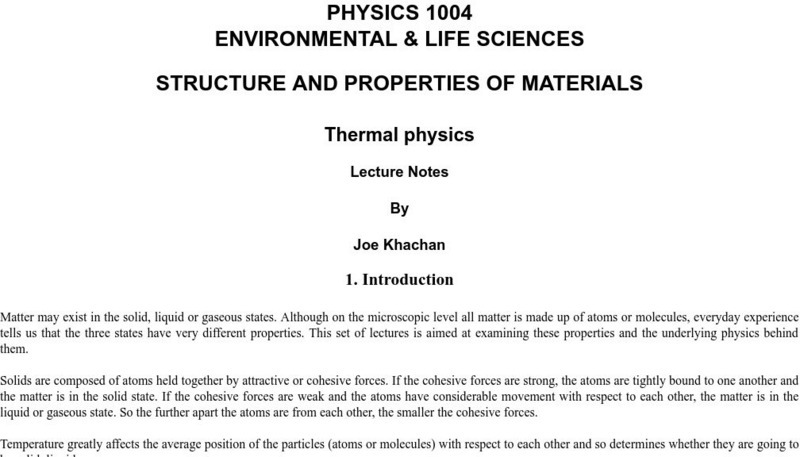University of Sydney (Australia)
Thermal Physics Module/heat Transfer 1 [Pdf]
The first of two pages discussing the different forms of thermal energy transfer. Equations expressing the rate of energy transfer by each of the methods are provided and discussed.
Other
Applied Thermodynamics: Heat Transfer
Heat transfer, rates of heat exchange,conduction, radiation and convection are defined and discussed at this site from Applied Thermodynamics. Well illustrated.
TeachEngineering
Teach Engineering: Ecology at Work
Students learn how rooftop gardens help the environment and the lives of people, especially in urban areas. They gain an understanding of how plants reduce the urban heat island effect, improve air quality, provide agriculture space,...
PBS
Pbs Teachers:world in the Balance: Who Will Take the Heat?
Examine the environmental, economic and political issues surrounding global climate change policy. Conduct a role-play, and explore the options available to tackle global climate issues.
TeachEngineering
Teach Engineering: What's Hot and What's Not?
With the help of simple, teacher-led demonstration activities, students learn the basic physics of heat transfer by means of conduction, convection, and radiation. They also learn about examples of heating and cooling devices, from stove...
TeachEngineering
Teach Engineering: Solar Water Heater
Student teams design and build solar water heating devices that mimic those used in residences to capture energy in the form of solar radiation and convert it to thermal energy. This thermal energy is next transferred to water (to be...
TeachEngineering
Teach Engineering: Insulation Materials Investigation
Students test the insulation properties of different materials by timing how long it takes ice cubes to melt in the presence of various insulating materials. Students learn about the role that thermal insulation materials can play in...
Georgia Department of Education
Ga Virtual Learning: Thermodynamics
In this interactive unit on thermodynamics, you'll learn why heat flows the way it does and how that flow of thermal energy can be put to good use in your daily life.
Science Buddies
Science Buddies: Project Ideas: How Horses Keep Warm in the Wind
In this mammalian biology science fair project, students will learn about methods of heat transfer and determine the best direction in which horses should stand in a cold wind to maintain their core temperature. The Science Buddies...
TeachEngineering
Teach Engineering: Cooking With the Sun
Students learn about using renewable energy from the Sun for heating and cooking as they build and compare the performance of four solar cooker designs. They explore the concepts of insulation, reflection, absorption, conduction and...
Georgia Department of Education
Ga Virtual Learning: Currents, Resistors, and Power
In this interactive tutorial students will learn about electric current, resistance and current density. Learn how current density relates to electric field strength and how resistance produces heat.
Other
Characteristics of Energy and Matter
A lengthy page from the Fundamentals of Physical Geography site. Energy is distinguished from matter, and the different forms of energy are identified and discussed. Four types of heat transfer (convection, advection, conduction,...
Curated OER
Physics4 kids.com: Electricity Conduction
Illustration showing how the space between atoms in a material affects the production of heat when an electric current passes through it.
TeachEngineering
Teach Engineering: Keep It Hot!
Student teams design insulated beverage bottles in this challenge, and test them to determine which materials work best at insulating hot water to keep it warm for as long as possible.
Curated OER
Colorado State Univ.: Heat Transfer Resistance Modeling
This site from the Colorado State University discusses the tranfer of heat by conduction and convection. Discussion centers around the application of these two heat transfer mechanisms to engines. The variables that effect the resistance...
CK-12 Foundation
Ck 12: Physics: Thermal Properties Study Guide
A study guide for concepts related to thermal energy.
Science Education Resource Center at Carleton College
Serc: Why Is the Earth Still Hot Inside?
In this lesson plan, students conduct heat transfer experiments to investigate why the Earth is still hot at its core, even after billions of years since its formation. They will learn that the rate of heat transfer is dependent on an...
TeachEngineering
Teach Engineering: How Hot Is It?
Students learn about the nature of thermal energy, temperature and how materials store thermal energy. They discuss the difference between conduction, convection and radiation of thermal energy, and complete activities in which they...
Alabama Learning Exchange
Alex: Popping Hot
In this lesson young scholars will discover the different forms of heat transfer such as conduction, convection, and radiation and that these forms can be demonstrated by popping popcorn. Students will learn the health benefits of...
Georgia State University
Georgia State University: Hyper Physics: Temperature Regulation of the Human Body
Discusses the methods the human body uses to regulate body temperature. Includes links to the four external heat transfer mechanisms (radiation, conduction, convection, and evaporation of perspiration).
TeachEngineering
Teach Engineering: Hot Cans and Cold Cans
Students apply the concepts of conduction, convection, and radiation as they work in teams to solve two problems. One problem requires that they maintain the warm temperature of one soda can filled with water at approximately body...
University of Sydney (Australia)
University of Sydney: Structure and Properties of Materials/thermal Physics
An exhaustive set of "lecture notes" on various topics in thermal physics (including thermal expansion). Explanations are well done and more interesting than most. Includes both a mathematical and conceptual treatment of topics. Humor,...
Environmental Chemistry
Periodic Table of Elements: Gallium
A very detailed look at the element Gallium, a member of the Boron Group.
Environmental Chemistry
Periodic Table of Elements: Indium
A very detailed look at the element Indium, a member of the Boron Group.


![Thermal Physics Module/heat Transfer 1 [Pdf] Handout Thermal Physics Module/heat Transfer 1 [Pdf] Handout](https://d15y2dacu3jp90.cloudfront.net/images/attachment_defaults/resource/large/FPO-knovation.png)

